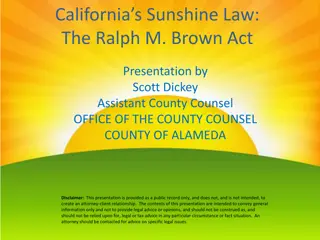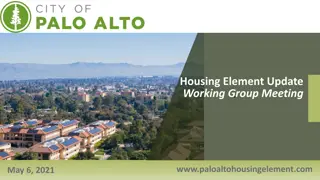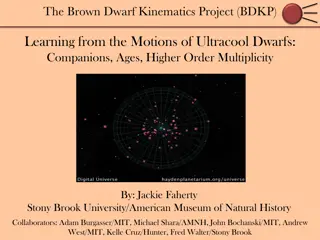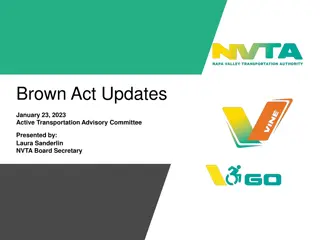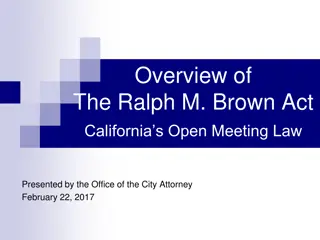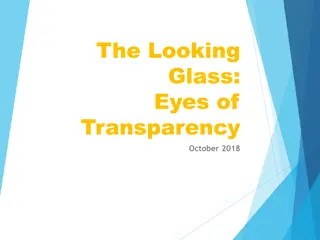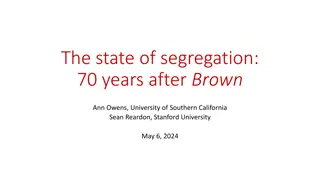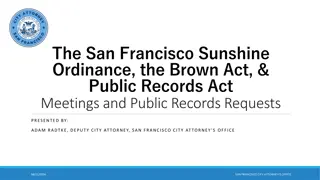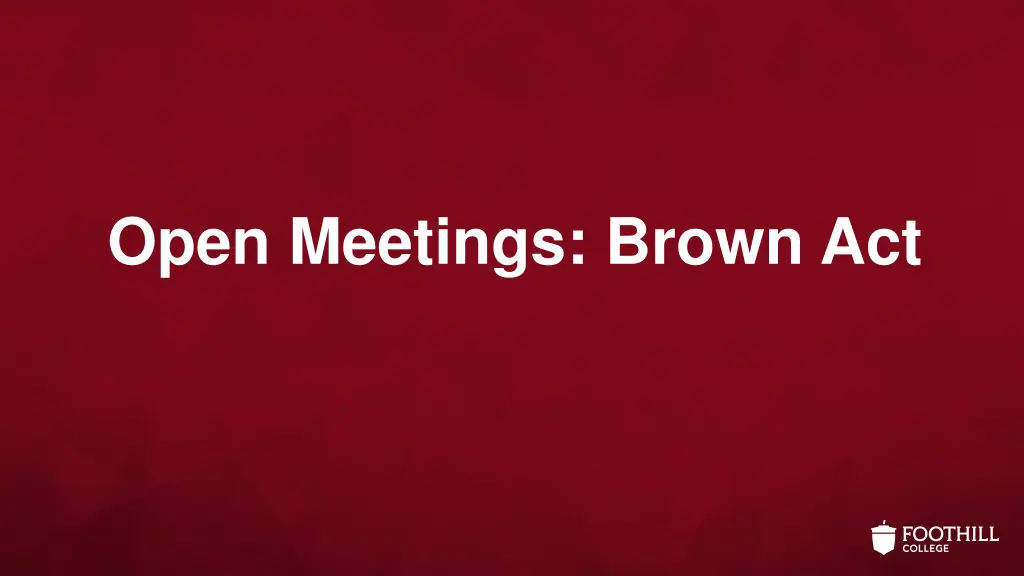
Understanding Brown Act Regulations
Discover the importance and implications of the Brown Act in promoting transparency and accountability in governmental decision-making processes. Learn about legislative bodies, academic senates, and appointed committees under the Act.
Download Presentation

Please find below an Image/Link to download the presentation.
The content on the website is provided AS IS for your information and personal use only. It may not be sold, licensed, or shared on other websites without obtaining consent from the author. If you encounter any issues during the download, it is possible that the publisher has removed the file from their server.
You are allowed to download the files provided on this website for personal or commercial use, subject to the condition that they are used lawfully. All files are the property of their respective owners.
The content on the website is provided AS IS for your information and personal use only. It may not be sold, licensed, or shared on other websites without obtaining consent from the author.
E N D
Presentation Transcript
Open Meetings: Brown Act 12345 El Monte Road Los Altos Hills, CA 94022 foothill.edu
Intent of the Brown Act The people of this State do not yield their sovereignty to the agencies which serve them. The people, in delegating authority, do not give their public servants the right to decide what is good for the people to know and what is not good for them to know. The people insist on remaining informed so that they may retain control over the instruments they have created. - Government Code Section 54950
Legislative Body (Gov Code 54952) Local body created by state or federal statute Committee (decision-making or advisory) created through formal action of a legislative body Standing committees with a continuing subject matter jurisdiction or a fixed meeting schedule by formal action
What about Academic Senate? Title 5, section 53202 establishes the procedures for the formation of an academic senate. The steps include a vote of the faculty, plus certain actions by the district board after the faculty vote (recognition of the senate, authorization for faculty to establish structures and procedures, etc.). The legally mandated joint action to be taken by the faculty of a community college and a district board in establishing an academic senate constitutes the requisite formal action contemplated by [the Brown Act]. - Attorney General Opinion No. 83-304 (1983)
Appointed Bodies - The Waterfall Effect Subcommittees: What about subcommittees created by the District Academic Senate (if any), Student Senates, or College Academic Senates? Bottom Line: Committees created by formal action of a legislative body are subject to the Brown Act.
Appointed Bodies Standing Committees Standing Committees of a legislative body are ALWAYS subject to the Brown Act. Standing committees, irrespective of composition, which have either: (1) a continuing subject matter jurisdiction, or (2) a meeting schedule fixed by resolution or formal action of the legislative body. Examples: long-term committees on budgets, transportation, professional development, or curriculum.
Relationship Between Parliamentary Procedure and the Brown Act Brown Act is law Parliamentary procedures are guidelines Examples of overlap: Consider items on agenda only Recording of votes Public comments May impose time constraints Chair (and other members) do not respond Types of voting: for example, roll call vote when teleconferencing
MEETINGS All meetings of the legislative body of a local agency shall be open and public, and all persons shall be permitted to attend any meeting of the legislative body of a local agency, except as otherwise provided in this chapter. -GC Section 54953(a)
What is a Meeting? Any congregation of a majority of the members of a legislative body at the same time and location to hear, discuss, deliberate, or take action upon any item that is within the subject matter jurisdiction of the legislative body. - GC Section 54952.2(a) The Brown Act is not limited to meetings where a final decision is made! HEAR DISCUSS DELIBERATE
Serial Meetings A majority of the members of a legislative body shall not use a series of communications of any kind, directly or through intermediaries, to discuss, deliberate, or take action on any item of business that is within the subject matter jurisdiction of the legislative body. - GC Section 54952.2(b)(1) Common Types of Serial Meetings: Daisy Chain Hub and Spoke Email
Brown Act Key Requirements Agenda posted 72 hours in advance Specify time and location of meeting Posted in a location that is freely accessible to members of the public and on committee website (if there is one) Provide opportunity for members of the public to attend and address the legislative body Only deliberate on items on the agenda Publicly report any action taken and vote of each member present No secret ballots for actions
The Publics Place at the Table (1) The legislative body must provide an opportunity for members of the public to directly address the body on each agenda item before or during the legislative body s discussion or consideration of the item. Every agenda for a regular meeting must also allow members of the public to speak on any other item of interest within the subject matter jurisdiction of the legislative body (even if not on the agenda).
The Publics Place at the Table (2) The legislative body may not prohibit criticism of policies, procedures, programs or services of the legislative body/agency. Reasonable regulations on public comment may be adopted (example: time limits for individual speakers). The legislative body may remove individuals from a meeting who willfully interrupt proceedings. -GC Section 54957.9
The Publics Right to Attend All meetings must comply with the ADA (Americans with Disabilities Act). Any person may record the proceedings via audio recorder, video recorder or still motion camera. No conditions may be set for attendance at or participation in a public meeting: Sign-in not required Self-identification not required as a prerequisite to speak No fees may be charged for providing notice
Zooming in? Teleconferencing requires ( 54953b): All votes by roll call Agendas posted at all teleconference locations Each teleconference location is identified in the agenda and notice of meeting Each teleconference location is accessible to the public Members of public may address the legislative body at each teleconference location
Resources Brown Act (full text) Open and Public

